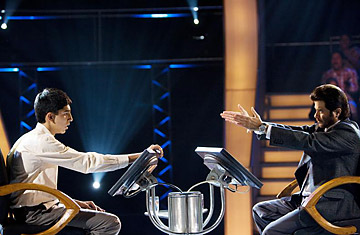
Dev Patel, left, and Anil Kapoor in Slumdog Millionaire
Danny Boyle, the director of Trainspotting, 28 Days Later and Millions collaborates with Simon Beaufoy, the screenwriter of The Full Monty and Miss Pettigrew Lives for a Day — surely we're in for some all-British shenanigans. But no, this is a social epic set in modern India, when Bombay became Mumbai and the new techno-wealth began to contrast ever more sharply with the crushing, enduring poverty of the masses.
One young man, Jamal (Dev Patel), has miraculously, or suspiciously, spanned those two worlds. A tea server, or chai wallah, for a telephone marketing company, he has won a fortune on the Indian version of Who Wants to Be a Millionaire. The show's host (Anil Kapoor) is so skeptical of Jamal's ability to answer the questions that he has policemen try to torture the truth out of the lad. His explanations all relate to his hard life as a homeless orphan in the company of his brother Salim (Madhur Mittal) and, not often enough, with the winsome, consistently abused Latika (Freida Pinto). Salim is a type-A troublemaker, a fighter and conniver, restless and reckless, and thus the ideal complement to Jamal's caution, sensitivity and resilience. These flashbacks constitute the body of a sharp, teeming, dark, very romantic film. (See other films from the Toronto Film Festival.)
As the boys forage through garbage heaps, get hooked in by child-molesting Fagins and slip into lives of petty or flagrant crime, you'll be reminded of Pixote and City of God and Oliver Twist and a dozen Indian musical melodramas — which are more sanitized by far but display the same obsession for family ties and first love, and are just as unashamed in pushing feelings of joy and despair to the apogee of passion. Jamal's search for his long-lost lifetime love Latika is the stuff of Indian-pop films from the Raj Kapoor era to today. True to its roots, Slumdog, adapted from the novel Q&A by Vikas Swarup, ends with a chastely rapturous kiss and an all-out dance number, composed by Bollywood deity A.R. Rahman. Despite its elements of brutality, this is a buoyant hymn to life, and a movie to celebrate.
See TIME's Pictures of the Week.